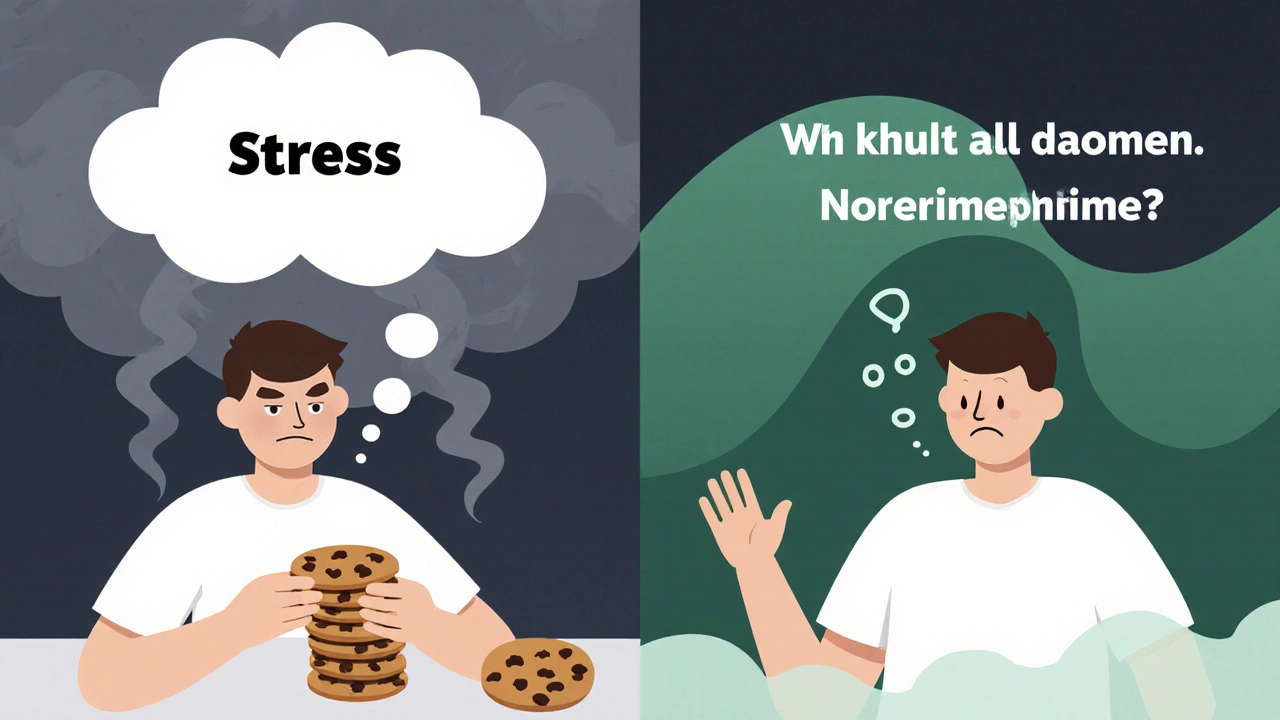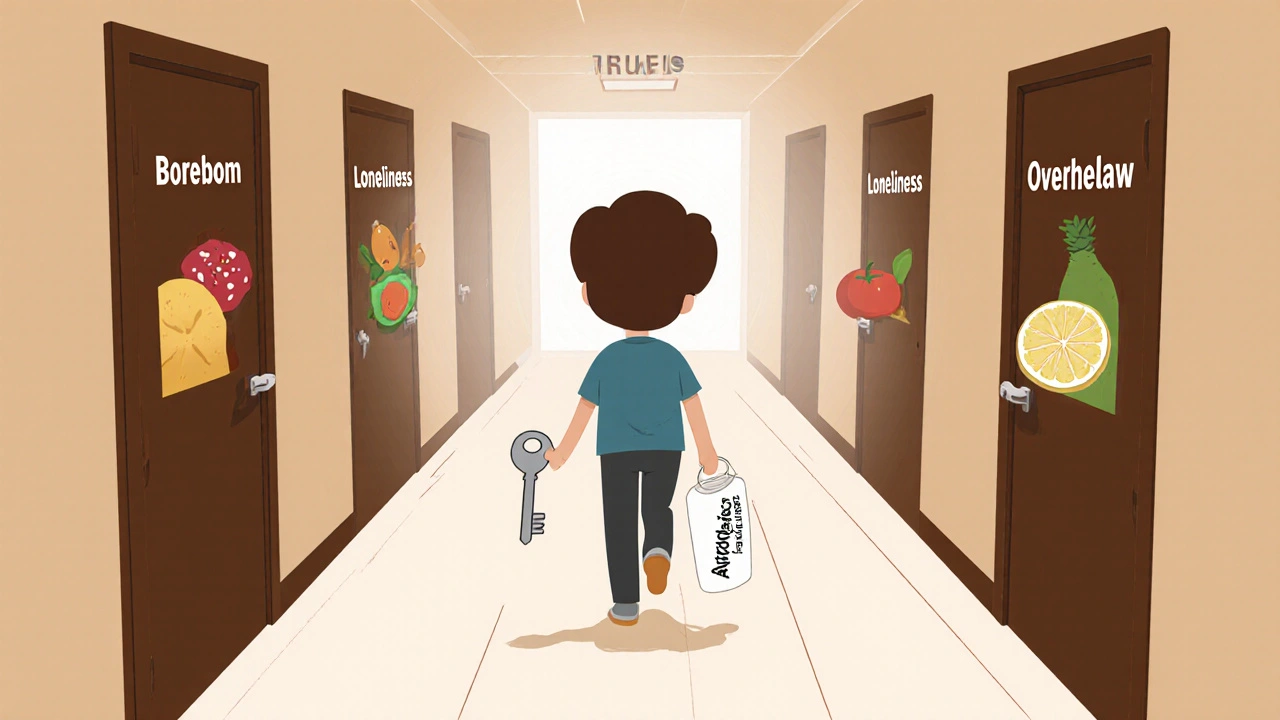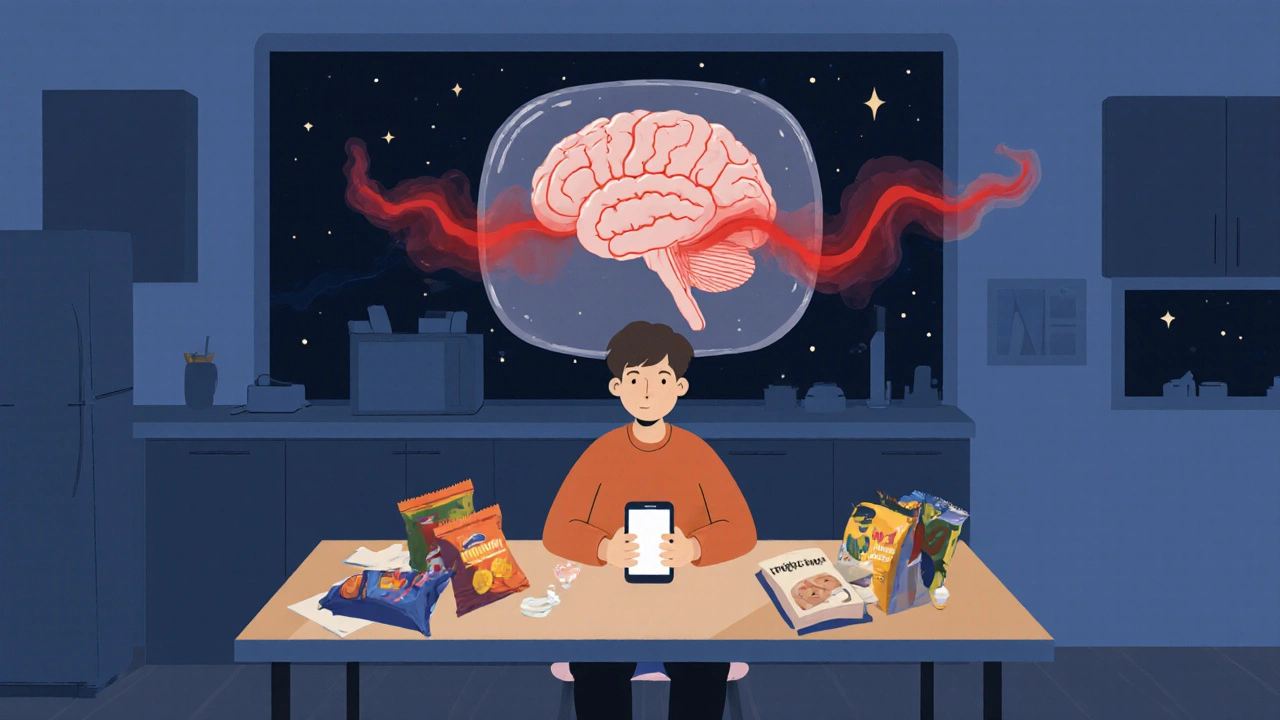Many people start taking atomoxetine for ADHD and notice something unexpected: their cravings for food, especially late at night or during stress, just… disappear. It’s not magic. It’s chemistry. Atomoxetine doesn’t treat obesity, but it can change how your brain handles emotional triggers-including the urge to eat when you’re anxious, bored, or overwhelmed.
What Atomoxetine Actually Does
Atomoxetine, sold under the brand name Strattera, is a non-stimulant medication approved for treating ADHD in adults and children. Unlike stimulants like Adderall or Ritalin, it doesn’t speed up your nervous system. Instead, it increases levels of norepinephrine in the brain-a chemical linked to focus, impulse control, and emotional regulation.
That’s why it helps people with ADHD stay on task, resist distractions, and pause before reacting. But norepinephrine doesn’t just affect attention. It also plays a role in how your brain responds to stress and reward. And that’s where emotional eating comes in.
What Is Emotional Eating?
Emotional eating isn’t about hunger. It’s about using food to cope. You feel stressed, so you reach for chips. You’re lonely, so you eat ice cream. You’re bored, so you snack. It’s automatic. It’s comforting. And for many people with ADHD, it’s a common way to self-soothe.
Studies show that up to 40% of adults with ADHD struggle with binge eating or compulsive food behaviors. That’s not because they lack willpower. It’s because their brains have trouble regulating impulses and managing emotional spikes. Food becomes a quick fix for a nervous system that’s always on edge.
How Atomoxetine Might Reduce Emotional Eating
When atomoxetine boosts norepinephrine, it helps calm the emotional noise. That means:
- You’re less likely to react to stress by reaching for food
- You notice cravings before they turn into full-blown binges
- You can pause and ask: "Am I actually hungry, or just overwhelmed?"
One 2022 study in the Journal of Clinical Psychiatry followed 89 adults with ADHD and binge eating disorder who were prescribed atomoxetine. After six months, 62% reported a significant drop in binge episodes. Many said they no longer felt "out of control" around food-even without changing their diet or starting therapy.
It’s not that atomoxetine kills appetite. It’s that it removes the emotional urgency behind it. You might still like cookies. But you don’t need them to feel okay.
It’s Not a Weight Loss Drug
Some people start atomoxetine hoping to lose weight. That’s a mistake. While some do lose a few pounds-usually 3 to 8% of body weight over 6 to 12 months-it’s not guaranteed. And it’s not the goal.
Atomoxetine is designed to improve focus and reduce impulsivity. Any change in eating habits is a side effect, not a feature. If you’re taking it solely to lose weight, you’ll be disappointed. And you might miss out on the real benefits: better sleep, fewer meltdowns, more consistent productivity.
Also, weight loss isn’t always healthy. Some people on atomoxetine lose muscle or become too thin. Others develop dry mouth, insomnia, or nausea. If you’re not eating enough because you’ve lost your appetite, that’s a red flag.

Who Benefits Most?
Not everyone with ADHD will see changes in their eating habits. But certain patterns make it more likely:
- You eat when you’re emotionally triggered, not physically hungry
- You feel guilty after eating, then eat again to cope
- You’ve tried diets, but they always fail because you "lose control"
- You have a history of impulsivity in other areas-spending, texting, quitting jobs
If this sounds familiar, atomoxetine might help. But it’s not a standalone fix. The best results come when it’s paired with behavioral strategies: tracking triggers, planning meals, learning to sit with discomfort without reaching for food.
What to Expect When You Start
Atomoxetine takes time. It doesn’t work like a stimulant, which kicks in within an hour. It builds up slowly. You might not notice changes in your eating for 4 to 6 weeks. Some people don’t feel anything until month two.
Side effects are common at first: nausea, dizziness, fatigue. These usually fade. But if your appetite drops too much, or you start feeling anxious or depressed, talk to your doctor. Dosing matters. Too low? No effect. Too high? You might feel numb or disconnected.
Keep a simple journal for the first two months: note when you feel the urge to eat, what you were feeling before, and whether you ate. You’ll start to see patterns. And you’ll know if atomoxetine is helping-or just masking the problem.
When It Doesn’t Work
Not everyone responds. Some people with ADHD and emotional eating don’t improve on atomoxetine. Why? Because the root cause isn’t norepinephrine. It might be:
- Chronic stress or trauma
- Depression or anxiety disorders
- Food addiction patterns tied to dopamine, not norepinephrine
If you’re still bingeing after 3 months on atomoxetine, don’t blame yourself. Your brain might need a different approach. Cognitive behavioral therapy (CBT) for binge eating, mindfulness training, or even medications like lisdexamfetamine (Vyvanse) may be better options.
Also, if you have a history of eating disorders like bulimia or anorexia, atomoxetine isn’t usually recommended. It can worsen anxiety or trigger restrictive behaviors. Always tell your doctor about your full history.

What to Do If You’re Considering Atomoxetine
If you’re thinking about trying atomoxetine for emotional eating, here’s what to do:
- See a doctor who specializes in ADHD-preferably one familiar with eating behaviors
- Be honest about your eating patterns. Don’t downplay them
- Ask if your symptoms match ADHD-related emotional eating
- Discuss alternatives: CBT, stimulants, or lifestyle changes
- Set clear goals: "I want to reduce binge episodes from 5 times a week to 1"
- Track your progress for at least 8 weeks
Don’t start atomoxetine just because you think it might help with food. Start it because you’re struggling with ADHD-and food is one symptom of that.
Real Stories, Real Changes
Emma, 34, started atomoxetine after years of nighttime bingeing. She’d eat entire bags of chips while scrolling on her phone, then cry afterward. "I thought I was just lazy," she said. After two months on atomoxetine, she stopped. Not because she didn’t like chips. Because she didn’t need them anymore. "I still eat them. But now I choose to. I don’t run to them when I’m upset."
Mark, 41, took atomoxetine for focus. He didn’t even think about food. But after six weeks, he noticed he wasn’t grabbing snacks at work anymore. "I used to eat just to pass the time," he said. "Now I just sit. It’s weird. But it’s better."
These aren’t miracles. They’re neurochemical shifts. And they’re possible.
Final Thoughts
Atomoxetine doesn’t cure emotional eating. But for many people with ADHD, it removes the fuel that makes it burn so hot. It doesn’t make you a better person. It doesn’t make you perfect. But it gives you space-to breathe, to think, to choose.
If you’ve been stuck in a cycle of stress-eating and guilt, it’s worth exploring. Not as a quick fix. But as one tool in a bigger picture: better sleep, therapy, movement, and self-compassion.
Food isn’t the problem. The brain’s response to emotion is. And sometimes, medicine can help you find your way back to control-not by suppressing hunger, but by quieting the noise that makes you crave it.
Does atomoxetine suppress appetite?
Yes, some people experience reduced appetite as a side effect of atomoxetine, especially in the first few weeks. This isn’t its main purpose, but it can happen because the medication affects brain chemicals linked to hunger signals. Appetite usually stabilizes after 4-8 weeks. If you’re losing weight unintentionally or feeling too full to eat, talk to your doctor.
Can atomoxetine help with binge eating disorder?
Atomoxetine isn’t FDA-approved for binge eating disorder, but research shows it can reduce binge episodes in people with ADHD who also struggle with compulsive eating. A 2022 study found that over 60% of participants had fewer binges after six months. It works best when emotional triggers are tied to impulsivity and poor emotional regulation-common in ADHD.
How long does it take for atomoxetine to affect eating habits?
It usually takes 4 to 8 weeks for atomoxetine to build up in your system enough to affect emotional eating. Some people notice changes in impulsivity and cravings as early as 3 weeks, but most see clearer results after 2 months. Don’t give up before then-this isn’t a fast-acting drug.
Is atomoxetine safe if I have a history of eating disorders?
Atomoxetine is generally not recommended for people with active anorexia or bulimia. It can increase anxiety and potentially worsen restrictive eating patterns. If you’ve had an eating disorder in the past, be upfront with your doctor. They may suggest therapy or a different medication instead.
Will I gain weight if I stop taking atomoxetine?
Some people do regain weight after stopping atomoxetine, especially if emotional eating returns. But it’s not guaranteed. If you’ve learned new coping skills-like mindfulness, structured meals, or therapy-you can maintain your progress. The key is not relying on the medication alone. Build habits that last beyond the pills.

OMG YES. I started atomoxetine for ADHD and didn't even think about food until I realized I hadn't binged in weeks. I just... stopped needing to. It's not about willpower, it's like my brain finally stopped screaming for comfort.
Still eat cookies. Just don't cry after them anymore.
Let me tell you something about neurochemistry, my friend. Atomoxetine doesn't fix anything. It just replaces one addiction with another. You think you're free from emotional eating? Nah. You're just numbed. The real trauma? Still there. Buried. Waiting. Like a bomb in your limbic system.
They call it medicine. I call it chemical surrender.
People really think a pill fixes ADHD-related bingeing? Wow. You're not healing. You're medicating away the symptoms while ignoring the root: bad habits, bad parenting, bad life choices. This isn't science, it's a Band-Aid on a hemorrhage.
And don't get me started on how Americans treat every emotional problem like a pharmacological glitch.
Just read the 2022 study cited here-62% reduction in binges? That’s HUGE. And it’s not even the primary indication. I work in behavioral health and we’ve seen this repeatedly with non-stimulants. The key is patience. It takes time, but the emotional regulation shift is real.
Also-yes, it’s not weight loss. But when your brain stops using food as a pacifier, the scale often follows. That’s not a bug. That’s a feature of improved neurochemistry.
Let’s be honest. This post reads like a pharma ad disguised as personal insight. Atomoxetine has a black box warning for suicidal ideation in kids. And now we’re praising it for suppressing emotional eating? What’s next? Prescribing antidepressants for bad relationships?
Stop medicalizing normal human suffering. Therapy costs money. Pills? Easy.
Hey, I just want to say-this is so validating. I’ve spent years feeling broken because I couldn’t stop eating when I was anxious. No one told me it might be my ADHD. I thought I was just weak.
It took 6 weeks for me to notice the shift. Now I sit with the urge. I breathe. Sometimes I still eat. But now it’s a choice. Not a compulsion.
You’re not alone. And it’s not your fault.
lol i mean... what if atomoxetine is just the gateway drug to the new age of neuro-control? 🤔
think about it-big pharma doesn't want you to feel emotions. they want you calm, productive, and docile. emotional eating? just a glitch in the capitalist system. fix it with a pill. genius.
also i think they're hiding the fact that it causes emotional blunting. like... are you really 'better' or just numb?
🫠 #neurochemicalsarenotfreedom
Every time someone says 'it's not about willpower' I want to scream. You think a pill makes you disciplined? No. Discipline is a muscle. You build it. Or you stay a slave to your impulses.
Atomoxetine doesn't fix ADHD. It just makes you quiet enough to ignore your problems. That's not treatment. That's suppression.
Also-why are we letting doctors prescribe mood regulators like they're vitamins?
My sister started this after years of guilt cycles with food. She didn’t lose weight, but she stopped crying after midnight snacks. That’s the win.
It’s not perfect. She got dizzy for two weeks. But she said she finally feels like herself-not just a storm of urges.
Thanks for writing this. It’s rare to see someone talk about ADHD and eating without shaming.
Just wanted to add-tracking triggers is the real MVP. I started journaling: 'What was I feeling before I ate?'
Turned out 90% of my binges happened after work calls. Not because I was hungry. Because I felt overwhelmed.
Atomoxetine helped me pause. But the journal helped me understand.
Both matter. Neither alone is enough. 💛
Interesting. But not groundbreaking. Norepinephrine modulation has been linked to impulse control since the 90s. This is just repackaged neuropharmacology with a wellness twist.
Also-why are we still calling it 'emotional eating'? It's maladaptive coping. Language matters.
As a Canadian who's been on this med for a year-I can confirm. The appetite thing? Real. But the bigger change? I stopped avoiding my emotions.
Used to eat to disappear. Now I sit. Even when it's hard.
Not magic. Just chemistry + courage.
Also-yes, the nausea sucks for the first two weeks. Drink ginger tea. It helps.
i started atomoxetine last month and i still eat ice cream at 2am but now i just feel... okay about it? like i dont hate myself after? is that normal??